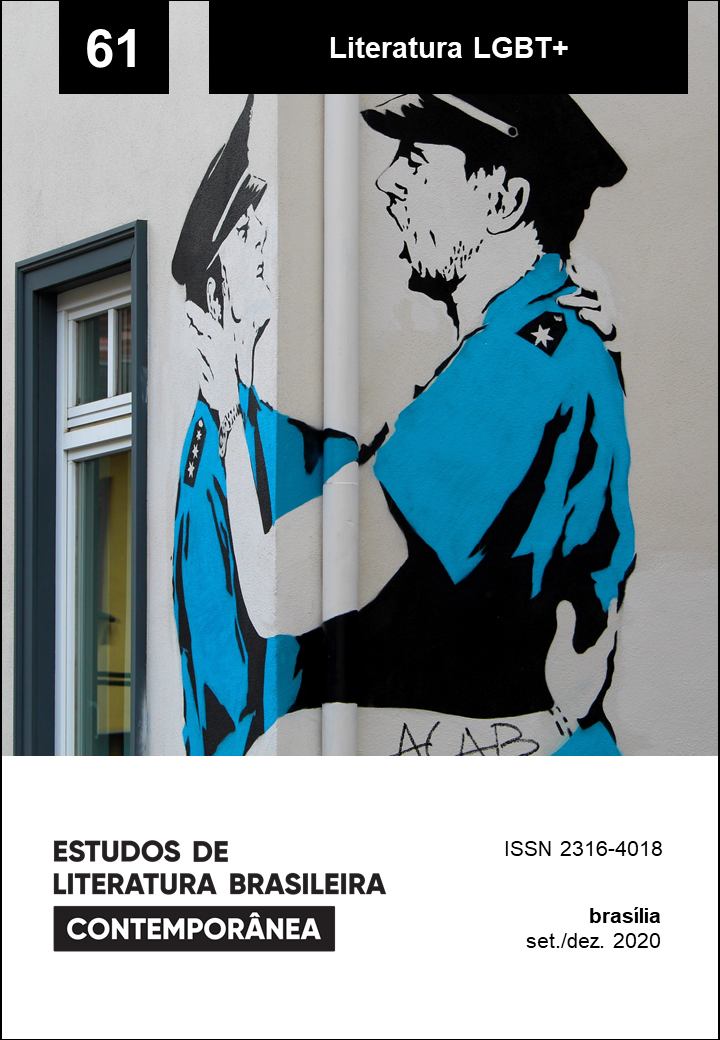On Lesbian Literature and the Occupation of Spaces
DOI:
https://doi.org/10.1590/2316-4018611Keywords:
lesbian literature, power relations, spacesAbstract
This essay aims to outline a reflection on the idea of ”‹”‹lesbian literature, connected to the concept of lesbian geographies (BROWNE et FERREIRA, 2015). Therefore, the ideas of plural lesbian identities will be discussed in perspectives that consider performances of gender, intersectionality and decoloniality. Space is fundamental to the perspective that this discussion intends to take, as it is in space that identity, social and gender relations take place, come into conflict and expose their dispositions towards domination and their incompleteness. The occupation of spaces, whether geographical, epistemic, theoretical or literary, by these lesbian existences, makes possible that new ethical and aesthetic proposals come into play. Considering lesbian ”“ and later lesbian ”“ as an adjective, we wish to reveal what new critical readings can be undertaken in the literary field.
Downloads
References
ANZALDÚA, Gloria (2017). Queer(izar) a escritora: loca, escritora y chicana. In: BRANDÃO, Izabel et al. (Org.). Traduções da cultura: perspectivas críticas feministas (1970-2000). Florianópolis: Edufal; Editora da UFSC.
APARECIDA, Luciany (2017). Contos ordinários de melancolia. Salvador: Boto-cor-de-rosa livros; ParaLeLo13S.
APARECIDA, Luciany. Auto-retrato. Salvador: Pantim, 2018.
ARNÉS, Laura (2016). Ficciones lesbianas: literatura y afectos em la cultura argentina. Buenos Aires: Madreselva.
BRAH, Avtar; PHOENIX, Ann (2004). Ain’t I a woman? Revisiting intersectionality. Journal of International Women’s Studies, v. 5, n. 3, 2004, p. 75-86. Disponível em: http://vc.bridgew.edu/jiws/vol5/iss3/8. Acesso em: 28 jan. 2020.
BRANDÃO, Izabel et al. (Org.) (2017). Apresentação. In: BRANDÃO, Izabel et al. (Org.). Traduções da cultura: perspectivas críticas feministas (1970-2000). Florianópolis: Edufal; Editora da UFSC.
BROWNE, Kath; FERREIRA, Eduarda (2015). Lesbian geographies: gender, place and power. London; New York: Routledge.
BUTLER, Judith (2017). Problemas de gênero: feminismo e subversão da identidade. Rio de Janeiro: Civilização Brasileira.
BUTLER, Judith (2004). Undoing gender. New York: Routledge.
Collot, Michel (2011). Le pensée-paysage. Paris: Actes Sud.
COLLOT, Michel (2014). Pour une géographie littéraire. Paris: Éditions Corti.
FERREIRA, Nina (2018). Pérola marrom. Brasília, DF: Padê Editorial.
JAGOSE, Annemarie (2017). Queer. In: BRANDÃO, Izabel et al. (Org.). Traduções da cultura: perspectivas críticas feministas (1970-2000). Florianópolis: Edufal; Editora da UFSC.
KOSBY, Marília Floôr (2017). Mugido. Rio de Janeiro: Garupa.
MOHANTY, Chandra Talpade (2017). Sob o olhar ocidental. In: BRANDÃO, Izabel et al. (Org.). Traduções da cultura: perspectivas críticas feministas (1970-2000). Florianópolis: Edufal; Editora da UFSC.
POLESSO, Natalia Borges (2018). Geografias lésbicas: literatura e gênero. Revista Criação & Crítica, n. 20, p. 3-19.
RICH, Adrienne (2012). Heterossexualidade compulsória e existência lésbica. Bagoas ”“ Estudos gays: gêneros e sexualidades, v. 4, n. 5, p. 17-44. Disponível em: https://periodicos.ufrn.br/bagoas/article/view/2309.
SILVA, Cidinha da (2018). O homem azul do deserto. Rio de Janeiro: Malê.
TEODORO, Simone (2016). Movimento em falso. São Paulo: Patuá.
WITTIG, Monique. The straight mind and other essays. Boston: Beacon Press.
Downloads
Published
How to Cite
Issue
Section
License
Copyright (c) 2020 Natalia Borges Polesso

This work is licensed under a Creative Commons Attribution-NoDerivatives 4.0 International License.
Authors who publish in this journal agree to the following terms:
a) The authors maintain the copyright and grant the journal the right of first publication, the work being simultaneously licensed under the Creative Commons Attribution License-Non Commercial 4.0 which allows the sharing of the work with acknowledgment of the authorship of the work and publication this journal.
b) Authors are authorized to enter into additional contracts separately, for non-exclusive distribution of the version of the work published in this journal (eg publish in institutional repository or as a book chapter), with authorship recognition and publication in this journal.
c) Authors are allowed and encouraged to publish and distribute their work online (eg in institutional repositories or on their personal page) after the editorial process, as this can generate productive changes, as well as increase the impact and citation of published work (See The Effect of Free Access).
d) The authors of the approved works authorize the magazine to, after publication, transfer its content for reproduction in content crawlers, virtual libraries and the like.
e) The authors assume that the texts submitted to the publication are of their original creation, being fully responsible for their content in the event of possible opposition by third parties.


